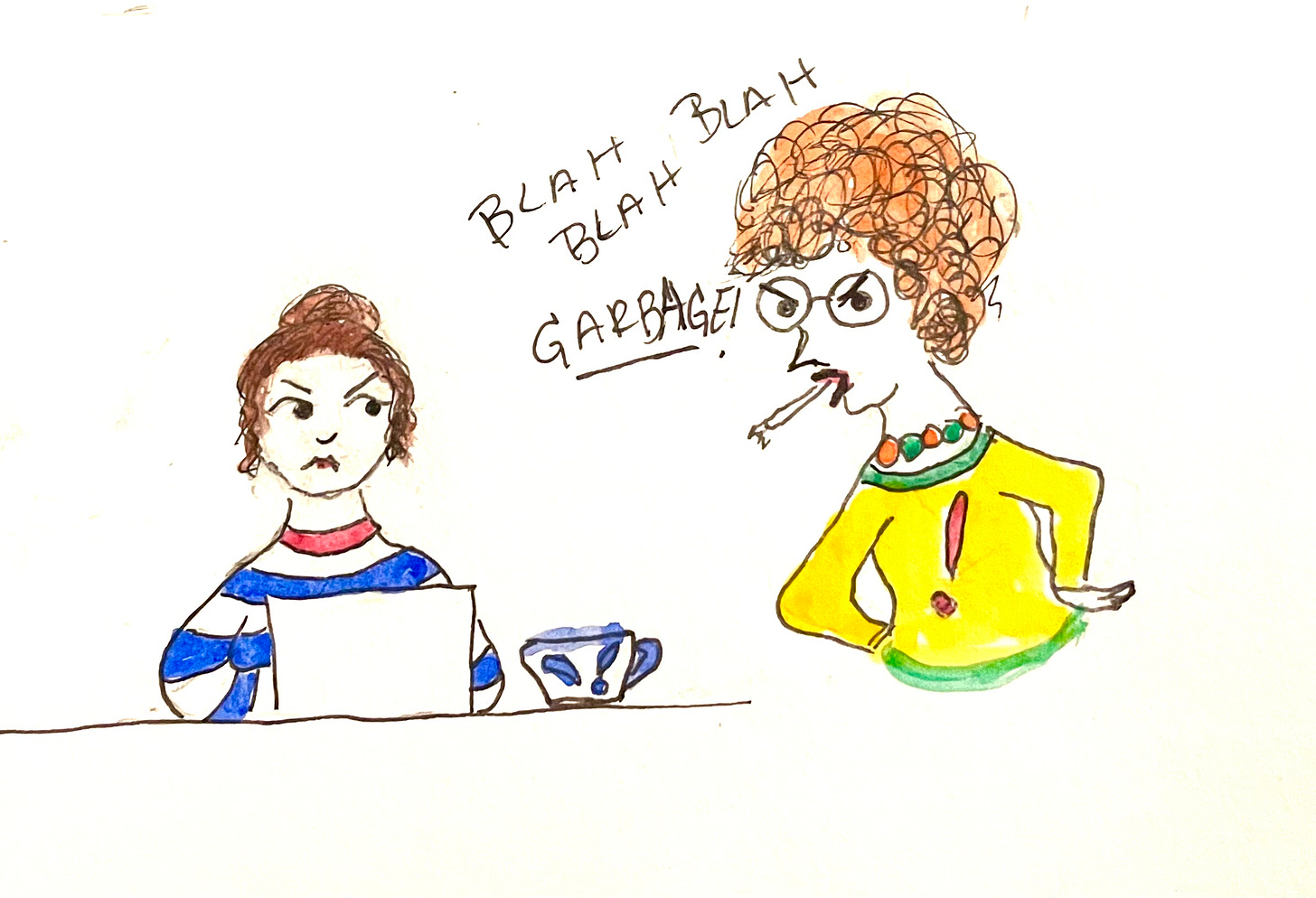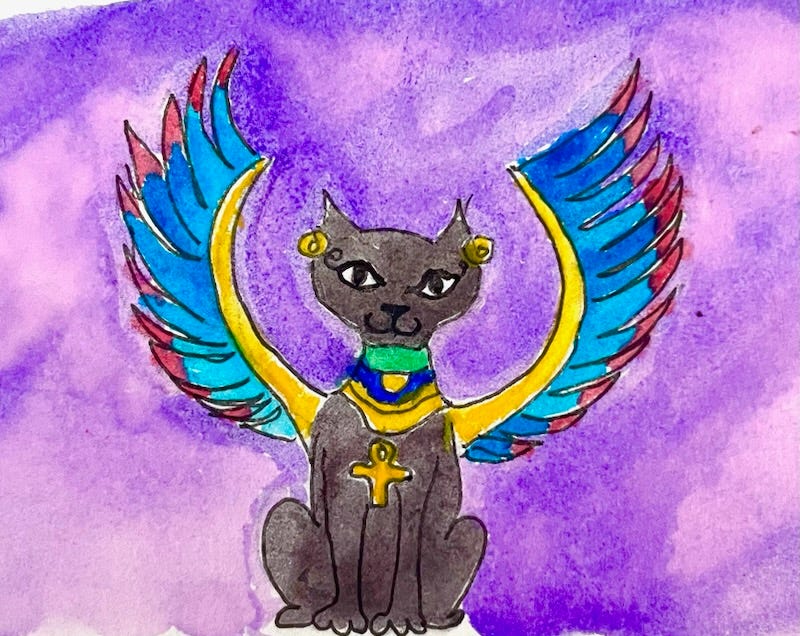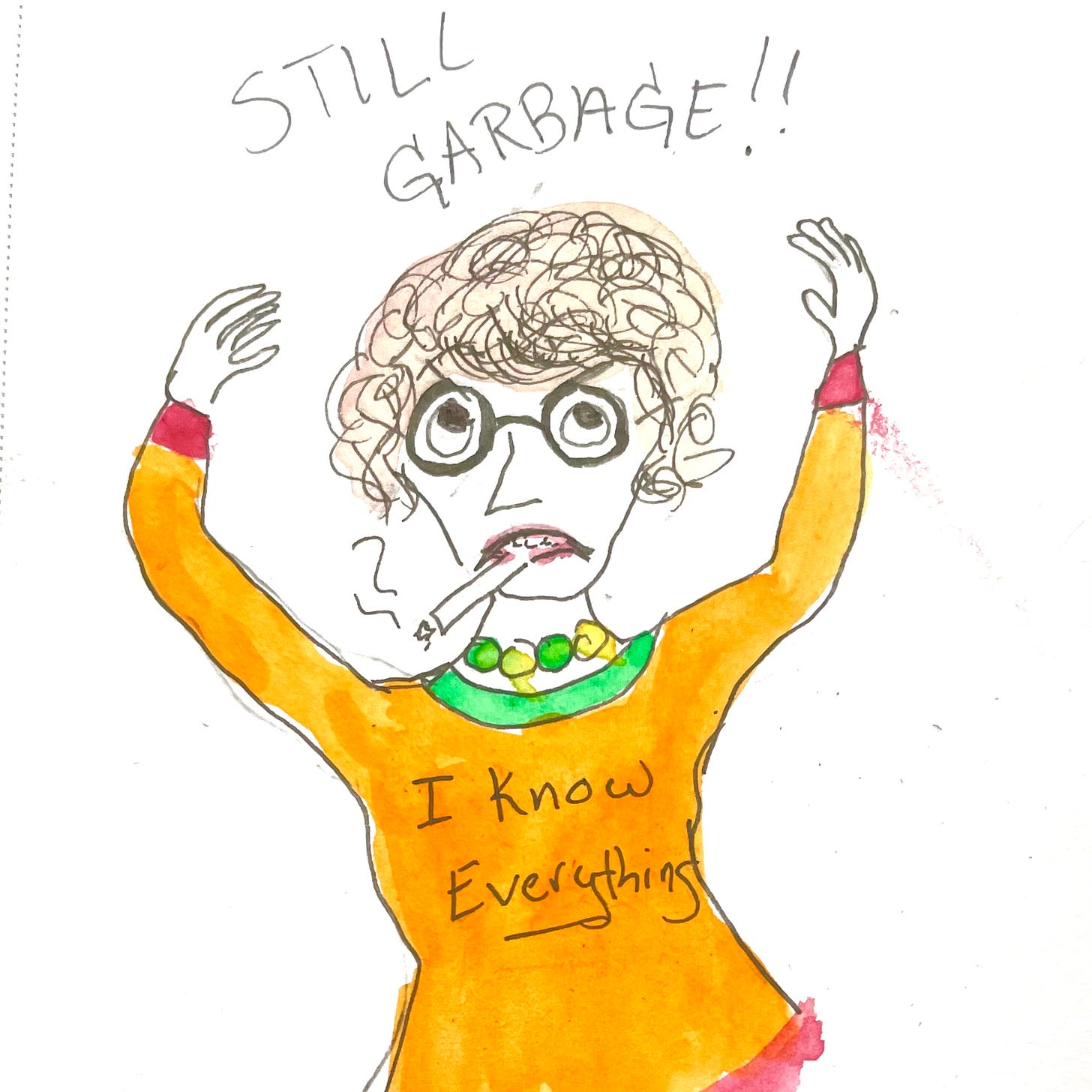I don’t know about you, but this week was a wily one for me. Every time I tried to write, there was a voice in my head telling me that whatever I was working on was garbage.
You know what I mean? You sit down, ready to make something, and then a voice comes in saying things like, “Oh, forget it.” “Who wants to read that?!” Etc, etc. Maybe you have your own versions.
I have a technique I use whenever this happens called, “Change the Tone.” There’s a story that goes with it that is better told out loud than written so the technique and the story are in the audio at the top of this post.
Here’s how you can work with it on paper. (This will make much more sense if you listen to the audio first.)
Write down all the disparaging things your mind has been saying.
ie: What if I’m not good enough? Why do I even try? Who cares? Why don’t I write more like so and so?
Then you change the tone to a more lighthearted, curious one, like my 3 year old’s version of “F—! The police!” in the audio.
ie: Who cares? (in despairing tone) becomes a sincere question.
Who does care? (I guarantee there are a few people. You, for starters. Your dog, who loves everything about you.)
Why don’t you write like so and so?
Then you answer the question in writing.
Keep doing this until your mood shifts. You might find that when you take the question more lightly/sincerely you get a wise answer. Or a surprising one.
Or you realize that it’s not even an interesting question because you’re going to do what you’re going to do anyway, so all of that noise your head makes doesn’t really matter. (This is what usually happens to me.)
Here’s what happened with my mean voice this week:
“All of this is garbage,” (Womp womp tone)
became:
“All of this is garbage! Hooray! I can stop working on it! Also, beautiful things can grow out of garbage! ”
I put the garbage aside to grow something. Then I went back into my journals where my happiest writing is and played around with a piece I started last year about the song Ring of Fire. (It’s at the bottom of this post.)
Then I painted a cat:
(I would have painted a cat singing Ring of Fire, but I didn’t feel like drawing a guitar.)
That felt pretty good, and the next time that voice came in—which it did right before I hit publish on this post—
I said, “So what?”
(“So what?” is another really good response to that voice in your head that’s a jerk. It’s effective on other people, too.)
I don’t know if this will work for you, it’s just an idea. You have plenty of your own wisdom. But for me, changing the tone always brings new openings into my work. And thoughts. So if you find yourself saying things like, “What is the point?” “Why bother?” and it’s dragging you down, you can always try asking the same question in a different, more excited tone.
Because some part of you knows.
You know why you’re doing this. You know why you bother.
Because you can’t help it. Because you like doing what you’re doing. Because deep down you know that the creative self matters, and so does your voice. Or maybe you bother because some part of you won’t stop, even if you think you should be doing something else.
Our hearts and souls are so busy, even when we think other parts are in charge.
I love this about being alive.
Here is the piece on the song Ring of Fire.
It was written in response to a prompt I gave in a workshop last spring. The prompt was:
“Tell a story about one of your favorite pieces of music—what you love about it, how it sings to you.”
If you want to use this prompt I recommend putting on the piece of music you love and writing for 15 minutes without stopping.
Here’s what I wrote—links to the songs are in the piece.
“One of my favorite pieces of music is Johnny Cash’s Ring of Fire. Of course, it isn’t really Johnny Cash’s song. June Carter wrote it before she was June Carter Cash, when she was married to Rip Nix. She had already met Johnny and had fallen fiercely in love with him even though she tried everything she could not to. What I love about that song is the trumpets, the way they come charging in and sing back to the first line. They are mariachi trumpets and the story I was told was that when Cash was getting ready to record the song he heard them in a dream. When he woke up he thought, “Yes. Mariachi trumpet. That’s what this song needs.”
This song makes me so happy. Every time.
It was the recessional for our wedding because I felt like that when I met my husband—like I couldn’t stop myself, like my heart spoke to my head, and there was no choice but to marry him. In our marriage I haven’t experienced the kind of burning desire for someone else that June Carter wrote about. I know lucky that is. That kind of longing is so sexy, I’m amazed that we’ve lasted 23 years without that particular brand of trouble.
If you hear June’s version of the song it is completely different than Johnny’s. He plays it on the guitar, with the “freight train” rhythm he was known for. She plays it on the autoharp, and where Johnny’s version gallops into form, hers comes in softly, like she is caught in an irresistible tide and can’t believe this is happening to her. And then in the middle when the fiddle comes in the song blooms with sweet, helpless longing. I don’t know which version I like better. It depends on the day.
Both are wonderful.
Once, before my children were born, I was in the kitchen of the house we lived in when I was in graduate school in Ohio. It was my birthday and I was listening to one of my favorite shows on the radio and they were playing Johnny Cash and had a live mariachi band and I could not believe it! All that joy, all those eruptions of sound.
That’s what’s so beautiful about trumpets--the way they burst into a room, taking no prisoners, amping things up until your feet can’t stand it and have to start moving. All these things happening in my kitchen made me so happy, I was bouncing around behind the counter by the stove when my father-in-law walked in the door.
He said hello and I said, “I am having the best day!! Mariachis are playing Johnny Cash on the radio and it is my birthday!”
My father-in-law, who was an engineer who worked for years at Lockheed Martin just laughed. I loved that about him. He was a quiet, mysterious person, but he always recognized delight in other people and met it with deep appreciation. When he was on his deathbed he said that he liked seeing that kind of happiness in his son’s life, because when it hit, I couldn’t contain myself.
This was a big compliment coming from a man who was very self-contained.
Years later, my sons and I learned to play Ring of Fire on the guitar. We sing it as a family--slowly and not very well. We’ve never quite been able to get the train rhythm that Johnny Cash had. But the song carries its own brand of joy and longing when we play it, and if nothing else, it is ours.”








Share this post